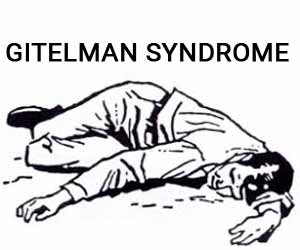- Home
- Editorial
- News
- Practice Guidelines
- Anesthesiology Guidelines
- Cancer Guidelines
- Cardiac Sciences Guidelines
- Critical Care Guidelines
- Dentistry Guidelines
- Dermatology Guidelines
- Diabetes and Endo Guidelines
- Diagnostics Guidelines
- ENT Guidelines
- Featured Practice Guidelines
- Gastroenterology Guidelines
- Geriatrics Guidelines
- Medicine Guidelines
- Nephrology Guidelines
- Neurosciences Guidelines
- Obs and Gynae Guidelines
- Ophthalmology Guidelines
- Orthopaedics Guidelines
- Paediatrics Guidelines
- Psychiatry Guidelines
- Pulmonology Guidelines
- Radiology Guidelines
- Surgery Guidelines
- Urology Guidelines
Recurrent Syncope, a rare presentation of Gitelman's syndrome: JAPI

A case of a 59-year-old male who was presented with a history of recurrent syncope and later diagnosed Gitelman's syndrome was reported in the Journal of Physicians of India (JAPI).
Gitelman syndrome, also known as familial hypokalemia-hypomagnesemia, is a rare genetic disorder in which there is a specific defect in kidney function. This defect impairs the kidney’s ability to reabsorb salt and causes changes in various electrolyte concentrations as well as contraction of extracellular fluid volume (thus causing symptoms of dehydration). Gitelman syndrome is a milder variant of Bartter syndrome.
The authors represented a case of a 59-year-old male who was referred from a peripheral hospital with a history of recurrent syncope since last 2 years. Syncope occurred at rest with no precipitating factors. Shockingly, there was no history of associated chest pain, dyspnoea, polyuria or symptoms suggestive of seizures. He was not on any regular medications. No significant past history.
According to the case study, a year ago, the patient was admitted for a similar episode at a peripheral hospital. He was treated conservatively at that time. Ecg at that time was suggestive of NSVT. He was discharged with advice to consult a cardiologist. This time again he went with a history of syncope and was transferred to our hospital.
On admission, the initial electrocardiogram (ECG) revealed nonsustained polymorphic ventricular tachycardia with intermittent sinus beats showing prolonged QT interval, features consistent with Torsades de Pointes. He was urgently put on temporary pacemaker support and intravenous calcium and magnesium were started.
Key diagnostic results
- Initial serum chemistries revealed a Potassium level of 2.6 mEq/L (normal range, 3.5 to 5.5 mEq/L) and a Magnesium level of 1.3 mEq/L (normal range, 1.2 to 2.1 mEq/L).
- Subsequent analysis of 24-hour urine chemistries revealed renal wasting of potassium, with a transtubular potassium gradient (TTKG) was approximately 12 (TTKG>7 indicates renal loss).
- The patient was also found to have persistently elevated serum bicarbonate of 28-30 mEq/L (normal, 22 to 32 mEq/L).
- The urinary calcium was subnormal at 1.2 m mols/24 hour (2.5-7.5 mmols).
- A transthoracic echocardiogram done on admission revealed an ejection fraction of 55%.
- The renin and aldosterone levels were within normal on serum assays, essentially ruling out hyperaldosteronism.
Diagnostic data of the patients made it clear that this was the case of hypokalemia combined with hypomagnesemia, and metabolic alkalosis. The patient was given the diagnosis of acquired long QT syndrome secondary to a metabolic disorder, most likely Gitelman Syndrome. He was treated with intravenous/oral repletion of potassium and magnesium daily, the serum potassium and magnesium levels normalized after 5 days of treatment, the temporary pacemaker was removed and the patient was discharged with the advice of regular potassium and magnesium supplements. He has been in 4 years of regular follow up with no recurrence of syncope since the
"Gitelman Syndrome was the most likely predisposing condition that led to the episodes of recurrent syncope and ventricular arrhythmias in this patient. Before starting patients on antiarrhythmic therapy for recurrent syncope due to arrhythmias, metabolic causes, such as hypokalemia and hypomagnesemia should be fully evaluated." the authors conclude
Furthermore, the authors stated that treatment should be directed at correcting potassium and magnesium depletion. It requires life-long supplementation and liberal salt intake. Potassium supplementation is with potassium chloride and potassium-sparing diuretics, including amiloride and spironolactone. However, in hypotensive patients, these drugs should be used with caution. Hypomagnesemia is corrected with magnesium chloride (magnesium sulfate or oxide are avoided to prevent diarrhea).
For reference, follow the link
www.japi.org

Disclaimer: This site is primarily intended for healthcare professionals. Any content/information on this website does not replace the advice of medical and/or health professionals and should not be construed as medical/diagnostic advice/endorsement or prescription. Use of this site is subject to our terms of use, privacy policy, advertisement policy. © 2020 Minerva Medical Treatment Pvt Ltd